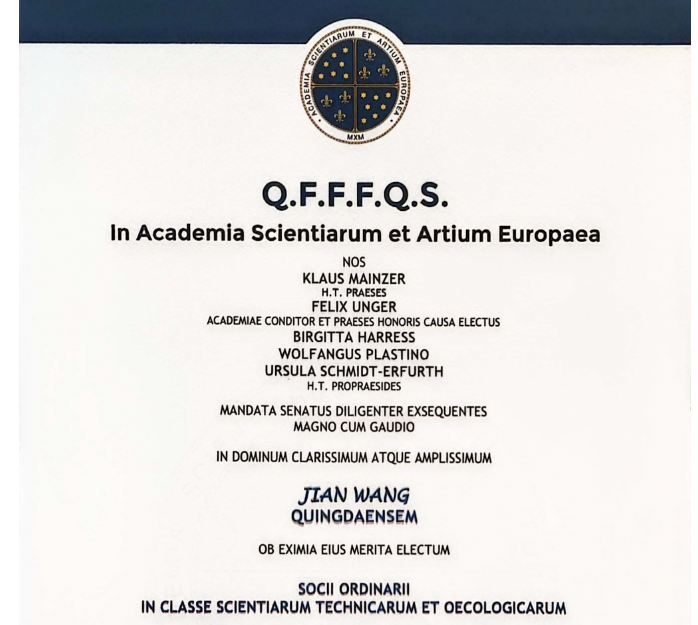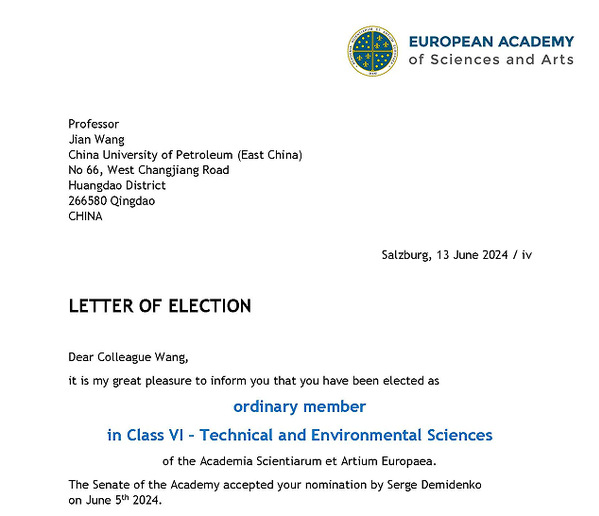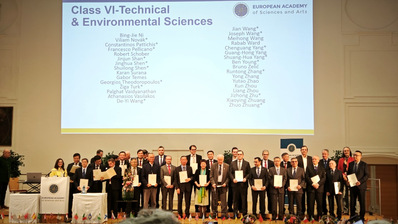On March 8, 2025, Professor Jian Wang from the College of Science attended the induction ceremony for new members of the European Academy of Sciences and Arts (EASA) in Salzburg, Austria, and received the Academy Medal. Other distinguished Chinese scholars present at the ceremony included Professor Zhuang Zhuo of Tsinghua University, Professor Xie Min of the City University of Hong Kong, and Professor Shan Jinjun, a Fellow of the Canadian Academy of Engineering and faculty member at York University, Canada.

Professor Jian Wang was elected as an EASA ordinary member (Division of Technical and Environmental Sciences) on June 13, 2024, following a nomination by Serge Demidenko, EASA Academician, IEEE Fellow, and Professor at Massey University, New Zealand. The decision was ratified through a vote by the EASA Academic Committee in recognition of Wang’s outstanding contributions to computational intelligence and its applications, as well as his groundbreaking achievements in high-dimensional feature selection and evolutionary large-scale sparse optimization based on neural networks and fuzzy systems. Professor Klaus Mainzer, President of EASA, sent a congratulatory letter to honor this accomplishment.

Professor Jian Wang serves as a professor and PhD supervisor at the College of Science, China University of Petroleum (East China), and is a council member of the Shandong Mathematical Society. He currently holds leadership roles as Director of the Cross-Media Big Data Joint Laboratory, Director of the Qingdao Key Laboratory of Industrial Artificial Intelligence, and Deputy Director of the Shandong Provincial Development and Innovation Laboratory for Energy Industry Big Data. His research focuses on embedded feature selection models, intelligent optimization theory, and big data modeling, with innovative advancements in neural network design, fractional-order learning theory, large-scale sparse optimization, and intelligent algorithms for petroleum engineering applications. He has published over 200 academic papers and received two Second-Class Liaoning Provincial Natural Science Academic Achievement Awards and a First-Class Natural Science Award from the Shandong Artificial Intelligence Society.
Professor Wang serves as an Associate Editor for multiple prestigious journals, including IEEE Transactions on Neural Networks and Learning Systems, IEEE Transactions on Emerging Topics in Computational Intelligence, Information Sciences, IEEE Transactions on Fuzzy Systems, and IEEE Transactions on Systems, Man, and Cybernetics: Systems. He has led or participated in over 10 major research projects, such as the National Natural Science Foundation General Program, sub-projects under the National Key Research and Development Program, the Ministry of Science and Technology’s “Belt and Road” Foreign Expert Program, the China-CEEC Higher Education Institutions Consortium, and CNPC’s Key Technology Collaboration Projects. He has also chaired several international conferences, including the 2022 IEEE Symposium on Explainable Data Analysis for Computational Intelligence (EDACI), the 2022 International Conference on Artificial Intelligence (Qingdao), and the 2023/2024 International Conference on New Trends in Computational Intelligence.

The European Academy of Sciences and Arts, headquartered in Salzburg, Austria, is an interdisciplinary organization dedicated to advancing global academic collaboration and fostering cross-disciplinary integration across sciences, technology, humanities, and the arts. It comprises seven divisions: Humanities, Medicine, Arts, Natural Sciences, Social Sciences/Law & Economics, Technical and Environmental Sciences, and World Religions. With over 2,000 members, including 28 Nobel laureates, EASA is renowned as one of the world’s most prestigious scientific academies.
Professor Jian Wang’s induction into EASA highlights his exceptional scholarly impact and international recognition in computational intelligence and interdisciplinary research.